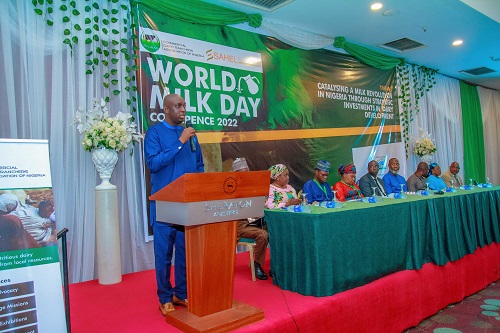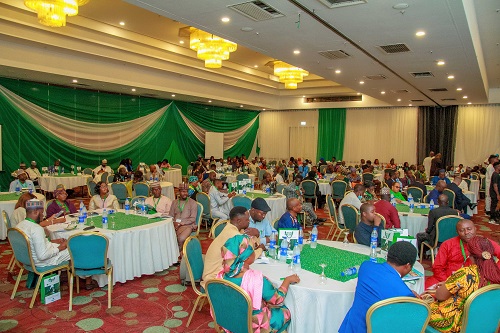The Nigeria Governors’ Forum joined several groups around the country to celebrate World Milk Day with a conference at the Ladi Kwali Conference Centre in Sheraton Hotel on June 1, 2022.
The Nigeria Governors’ Forum joined several groups around the country to celebrate World Milk Day with a conference at the Ladi Kwali Conference Centre in Sheraton Hotel on June 1, 2022.
The conference was hosted by the Commercial Dairy Ranchers Association of Nigeria in partnership with Sahel Consulting. The theme of the conference was “Catalysing a Milk Revolution in Nigeria through Strategic Investments in Dairy Development”.
The conference consisted of presentations such as Investment Opportunities in Animal Feed Commercialization in Nigeria Dairy Sector, Unlocking Wealth Creation Opportunities in Rural Communities through Financial Inclusion, Food Safety: Understanding Nutrition Fact Labels on Dairy Products, The Importance of Data in Dairy Sector Transformation: Lessons for Nigeria by Dr. Ayoola Shoyombo, a Senior Lecturer in the Department of Agricultural Sciences, Landmark University, a panel discussion on taking practical steps to promote backward integration for milk sufficiency in Nigeria and an interactive feedback session with the Nigerian Institute of Animal Science (NIAS) featuring the Minister of Agriculture representative and Director, Department of Animal Husbandry Services, FMARD; Mrs. Winifred Lai-Solarin, MD/CEO Integrated Dairies Limited, Jos; Mr. Sheyin Shekarri, GM, Delifrost Caterers Nigeria Ltd; Anthony Alkosseifi and Mr. Deji Adebusoye, Principal, Sahel Capital.
In attendance at the conference was the Senior Agricultural Advisor, Professor Abba Gambo along with Akanbi Olubunmi. O, the Senior Research Officer, Muhammed Musa, Researcher.
Professor Abba Gambo, the Senior Agricultural Advisor gave an opening remark at the event. He began by saying that NGF determines and advises the Governors on policies they can implement in their state for the betterment of humanity.
He added that the reason why all stakeholders should partner with the NGF is that the NGF is the fastest, safest, most effective, and the most efficient means of getting to the Governor.
‘‘The Governors meet every month. If there is something you want the Governors to know, we will make it part of the agenda and priority for the Governors,’’ he said.
Furthermore, he stated that NGF is ready to partner and collaborate with all those that are interested in moving the agricultural landscape in Nigeria forward.
At the conference, there was a presentation by the President of, the Agricultural Correspondents Association of Nigeria (ACAN); Mr. Oba Olasunkanmi John who said that Nigeria has the highest population of cattle in the world, ranking at number 5.
He stated that Nigeria is supposed to be the country that invests more in milk production because of the financial potential in providing jobs and the GDP. However, the statistics show that Nigeria only produces 40% and is exporting 60% of its dairy products.
He added that the private sector is trying but they can invest more, and they should take advantage of the benefits of dairy products because Nigeria is not producing up to 10% of the milk needs.

At the conference, there was also a keynote address by Dr. Hope Pachena, the Operations Officer at the Upstream Manufacturing, of Agribusiness and Services, Sub-Saharan Africa, International Finance Corporation (IFC).
He stated that there is a big opportunity in the milk production sector and that the milk sector can bring developmental impact and change the lives of Nigerians.
‘‘Domestic milk production in Nigeria is insufficient to meet the national demand for milk; 60% of the milk consumed is imported to bridge the local supply gap,’’ he said.
Dr. Pachena added that if there are any challenges with the policy, the World Bank works directly with the government to handle issues that relate to the policy.
In his presentation, he stated that the IFC can support the development of Nigeria’s dairy sector leveraging a three-step upstream engagement approach.
The first step is to “identify like-minded sponsors willing to develop the local dairy sector.” This would involve selecting sponsors that are willing to develop the local dairy value chain alongside IFC MAS Upstream.
Then, they would negotiate and agree on engagement terms. After, they would finalize the required processes and approvals for engagement to work together on project development activities.
Secondly, step two is the “Diagnostics of dairy sector challenges and identifying the right business model.’’ This entails working with like-minded sponsors to assess the dairy industry status in selected and agreed states, including (if necessary) detailed feasibility studies to gain an understanding of the existing dairy production and farmer aggregation models in use.
There is a need to have a clear picture of what is working, and what is not working well in the value chain in the identified State. Next is the identification/diagnosis of the key blockages/ bottlenecks preventing full integration/growth in the dairy value chain.
Plus, what is needed would be to prepare a roadmap and timelines and proceed with agreed project development activities. Step three is to implement agreed project development activities with identified sponsors.
This means working with an identified like-minded sponsor and using the diagnostics findings of Step 2 to implement project development activities. They would have to consider the state of the industry in the state and the performance gaps identified.
In addition, they would need to create a project plan with an investment line of sight.
Challenges:
- Farmer Productivities Challenges such as indigenous cows with a low yield of milk, Limited access to water and field, Limited access to input such as a vaccine, multi-vitamins, Health care services, etc.
- Farmers limited participation in the formal dairy sector.
- Gender-Specific Challenges in the Dairy Sector e.g. Access to funds, Limited access to Extension agents.
- Nutrition Challenges etc.
Way Out:
- Awareness, orientation & re-orientation of the current highest dairy producer.
- Training & retraining of personnel involved in dairy data collection
- Selection and re-selection for the desired dairy trait.
- Cross-breeding with compatible exotic dairy breeds.
- Desired gene stabilization.
- Reduction of Milk Import.
- Increase participation of smallholder farmers in the formal sector and value chain.
- Increase extension agent specialist etc.
Few Statistical Data at the Event:
- Ethiopia, Kenya, South Africa, and Sudan are the highest milk-producing country.
- Ethiopia has the most cow.
- South Africa has the greatest milk production per cow.
- Only Ethiopia and Kenya are self-sufficient.
- Nigeria spends N570 Billion on importing Dairy products to Nigeria.
- Pastoralists account for 95% of Milk production in Nigeria.
- Commercial farmers account for only 5% of local milk production.
In his presentation, he elaborated on what must be adhered to when distributing dairy products such as packaging, packaging materials, label and labeling information, nutrition facts, and laws that govern labeling in Nigeria. He emphasized that a good and well-blended product should have protection, safety, attractiveness, useability, and sustainability.
The packaging of the products matters because it has a direct influence on how far a product will go. The material used in packing a product depends on the nature of the product, the associated hazards – chemical, physical, and biological, the mode of distribution, and the integrity of the product.
He also provided some nutritional facts being that the declaration of nutritional information is a statutory requirement – Section 19 of Pre-Packaged Food, Water, and Ice Labelling Regulations, 2019, nutrition claims must be declared and substantiated – scientifical evidence is important.
Also, nutritional facts must be declared per 100gm or 100ml per serving of the product with all ingredients and including additives must be declared. Also, a specific requirement for Nigeria’s population is in Regulations 3(5), 4, and 5 of Milk and Dairy Products Regulations 202.
He also concluded that the nutrition fact label is a statutory requirement by law that both manufacturer and consumer must note for proper information sharing.
Secondly, adherence to the instructions on the label will enhance the efficacy of the product. Lastly, the label will also enhance trade and help to resolve disputes.
The close of the conference involved other breakout sessions on unlocking wealth creation opportunities in Rural communities through financial inclusion and then there was a summary of the breakout session.
By Isioma Ononye,
Media Officer



